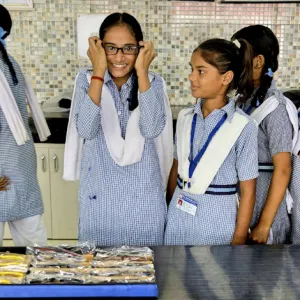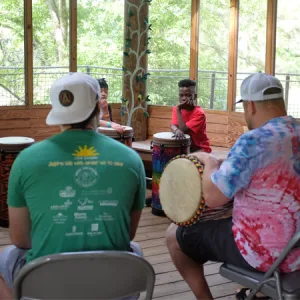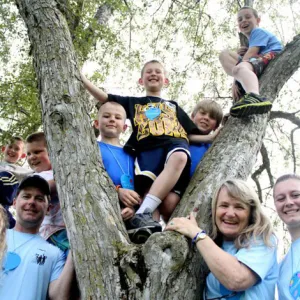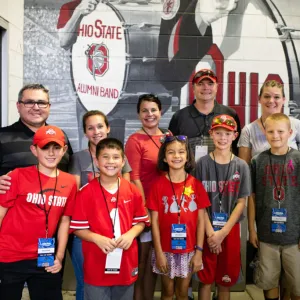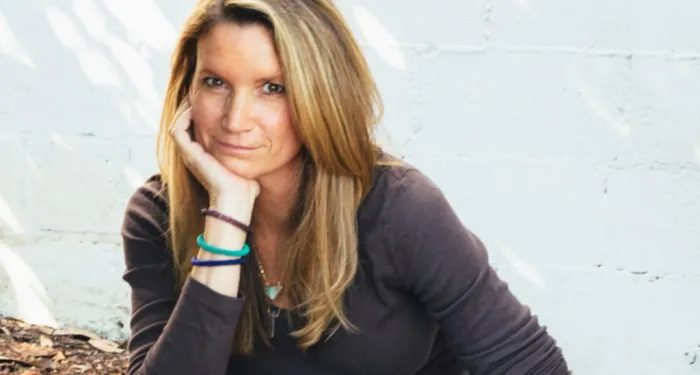
Aug 1 | 2017
A Conversation with Becca Stevens of Thistle Farms
Rev. Becca Stevens is the founder of Thistle Farms and Magdalene House, which have helped hundreds of women escape addiction, trafficking and violence—work that's rooted in the tragedy and abuse she herself faced at a young age. When she sat down with Crazy Good Turns for Episode 11 of Season 2, Stevens opened up about how her own road to healing led her to be an advocate for others, and how her organization plans to help more women on an international scale in the future.
Why don't we start by talking about your background—where you were born and raised and what your childhood was like?
BECCA STEVENS: I was raised here, Nashville, Tennessee. My whole family comes from Connecticut and New York. We moved down here in 1968 and I was a little girl. Mom and Dad pack up a panel-sided station wagon, we drive down and then he was killed by a drunk driver that same year. My mom was 35 years old and left with five kids.
We went straight to being on the dole really. We were raised on social security. My mom worked in daycare. Our vacation, once a year, we all piled in and went down to Chattanooga to see Rock City, Tennessee. It was pretty small world really. That's a lot of times what happens when people have some tragedy—they're thrown into a pretty small world, trying to keep things together.
The other thing that happens to a lot of people, a lot of the women I serve, and what happened to me is the guy that came in and took my dad's jobs—my dad was an episcopal priest—and the guy who came in to the church to help out while they were looking for another pastor, he really took advantage of my family and me. He abused me sexually for several years. It all started in the church.
In some ways it was a really startling way to wake up into the world as the death of your dad and an abuser coming right in on the heels of that.
In another way, while the world was small, I had a window. I could sense that there were communities that were safe, and communities that were really unsafe. My mom was a really safe place. Many, many of the folks I serve don't have that. I'm so grateful to her. And I'm really grateful that I had a sense of wellbeing and belonging through it all. I don't know where that came from, but it feels like one of the biggest gifts in my life. I knew that in some ways, I was probably stronger than the guy who was abusing me. I knew that this wasn't going to be my story.
How would you describe yourself as a little girl?
STEVENS: I think I was always an entrepreneur, always looking for ways that I could make some money. And I was pretty creative. I was really defiant, but I was also really scared of a lot of stuff. I looked brave at school, but I was scared to get to school. I was scared to stand at the bus stop. I think that's what happens a lot of times when kids are abused or thrown into violence. It's like you trade your innocence in for fear. I could be fearful of things that I don't think anybody even knew.
I had a defiant spirit with authority in many, many ways. But I sailed through school. I always had that as one of the gifts. School was never even a bit of a problem.
Meaning you were a great student?
STEVENS: I was. Isn't that crazy? I was a math major in college. Always loved studying. I always loved books.
One of the things I also read was that one lesson of your abuse as a child was learning not to trust authority. How has that lesson come to play out in your life?
STEVENS: Oh my Lord. That is not unique to me. That fear of authority once you've been abused is pretty common. The reason that prisons don't work for the vast majority of women who've experienced abuse and trauma as kids, because that's just a trigger. It's more traumatizing, doesn't help.
In some ways, it's been a gift, because I've felt wonderful being an entrepreneur and being in a community. I don't have to be the boss. I can be in the boat with other people and I love that and I love feeling like I'm on a team.
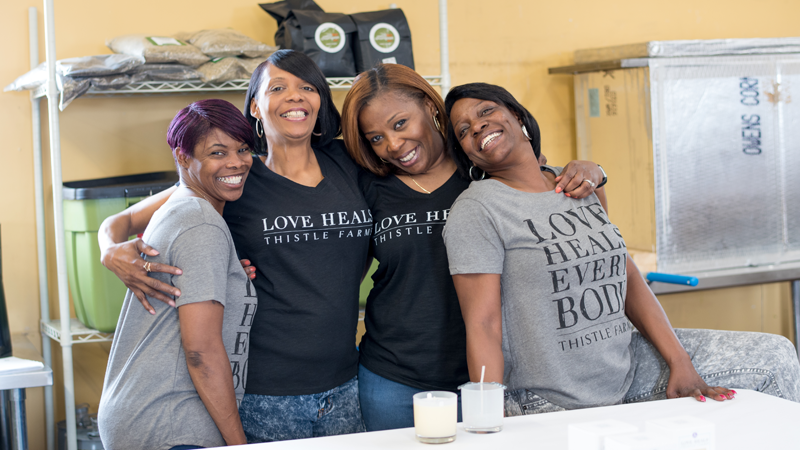
It's been hard in some ways, because I'm an episcopal priest. So, you have a bishop and all those relationships over the 25 years I've been ordained it's, has been a little bit rocky. I've had some great experiences, but it's been hard. I remember going through seminary and thinking, "Okay, my goal is not to cry when I have to go talk to the bishop." I never achieved that goal when I was in seminary.
You cried every time?
STEVENS: Every time. Can you imagine?
Why did you cry?
STEVENS: I think because, it was very authoritarian. It was very…I don't know what the word is. It was so close to my heart.
With all the stuff I had gone through growing up, God was never my problem. It was this loving presence, this feeling of wellbeing. But the institution was really hard for me. I think it was somehow they were going to try to direct what I was feeling led to do in my work.
I knew that the work I wanted to do, I did not want it to be a religious organization. I never wanted the community of Thistle Farms to be a faith based organization, because I think the church had not been that safe for me.
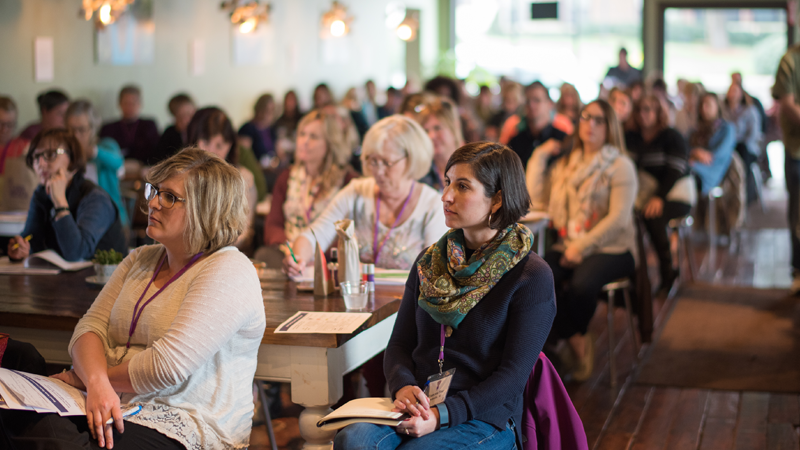
I wanted to do it out of my faith and out of love, but I wanted it to be a free-standing, open community where anybody could choose their path of spiritual wellbeing. For some people that means not doing anything. For other people it means they become whatever denomination or faith they feel led to. But I wasn't going to be in control of that. When you're in the church, that's really hard for them to fathom.
We don't have to make everybody believe what we believe. I go around and talk all over the country. I guarantee you that I'm either "not Christian enough" or "too Christian" for most people I talk to. It's like, don't worry about it. Just live your life.
You don't have to change me. I don't have to agree with you. All we have to do is figure out how to love each other and work together to help people. That's what we're called to do—just love the world.
Let's get into Magdalene and Thistle Farms, and how everything got started. It was interesting to read in your book Snake Oil that you had been thinking about something like Magdalene for awhile, but then the impetus was actually you putting your son into a car seat.
STEVENS: I started doing work with women who were on the streets and women in prison. I knew I wanted to do it differently.
I wanted to create communities. I didn't want shelters, halfway houses, treatment centers. I wanted a community and a sanctuary. And I thought it would be beautiful to have no authority in the house, and just to have the women be together and we could figure out together what healing would look like for them.
I mean, from all the trauma, all the trafficking, abuse, addiction, prostitution—all of it. I knew that's what I wanted to do. But it's much harder to do things than to say it, or think it, or even dream it.
My husband was on the road for the country music record he was doing at the time. I had one son and I was pregnant with my second son. I was downtown working with some homeless women, and it was at the end of the day. I had my son with me and I was putting him in the car seat. He was doing that arching back thing, being hard to maneuver into the car. And all of the sudden he says to me, "Hey mama, why is that lady smiling?"
Across the street from where we were working at the homeless center, there was a strip club called The Classic Cat. And there was a huge poster outside of a woman in a catsuit, scantily clad, smiling. Just ear to ear. Cat ear to cat ear.
I looked at him as he said it. Then I looked up there. And I just thought how that question broke my heart, because someday my little boy is not going to ask that question of "Why is this grown woman in a catsuit on a poster smiling?" It will blend into the whole landscape of how women have become commodities, and are bought and sold for less than you can buy and sell a pet cat.
As I was driving home I thought: I'm done thinking about it. I want him to know that I did something on behalf of women, and that he's going to be able to love and respect women. We're going to start this tomorrow. And that was it.
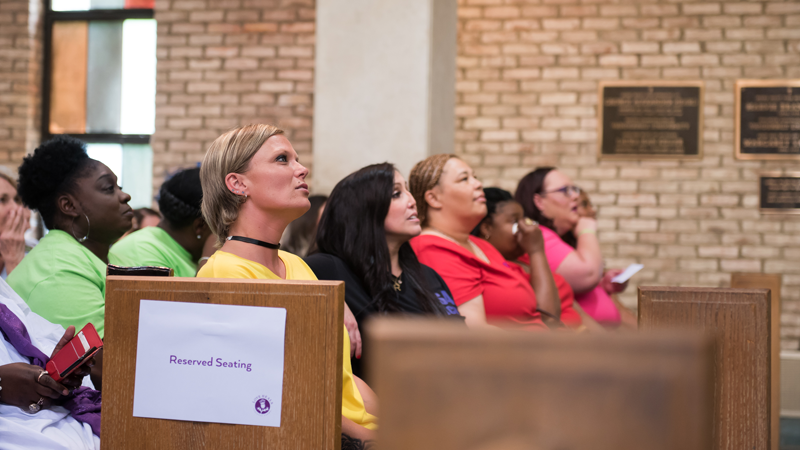
Can you describe the typical journey that women go through to get to Magdalene?
STEVENS: We have 100 women on our waiting list. We have women from every state that want to be a part of this community and want to join in this powerful witness for how love heals for women who have histories of trafficking, addiction, and prostitution. We have about 40 sister communities now around the country that have adopted this model.
The way women get there—to any of these communities, including ours—is a pretty universal story that individual women just bear on their backs. It starts in childhood trauma. On average the women that we serve are first raped between the ages of 7 and 11 and they hit the streets on average between the ages of 14 and 16 years old. They have experienced the inside of prison walls. They have endured the underside of bridges. They have survived the backside of anger. All of it.
When they come to us, most of the women don't really have hardly anything but some hope. They come and the first thing that happens is they're allowed to rest. Just go to bed and relax. This is your space, your place. They start going to groups, whether it's trauma therapy groups, or prostitution groups, or life skills classes, or financial classes, parenting classes. They go to classes three days a week and they go to IOT, which is Intensive Outpatient Therapy, to start learning about what they're triggers are and what their addiction is.
Then they go to a doctor and a dentist. They get assessments and find out how much damage has been done to their bodies, and what they need to have happen. They find a therapist and they begin to have a safe place. Because we're not just talking about healing from the streets. We have to go back a lot farther than that, because nobody at five or six years old thinks, "What I'd really like to do is be prostituted around the country." That's not anybody's ideal way of living.
What happened along the way was the result. Some people say, "It's the choices women make." But it's like, if that is the choice what were the options?
Anyway, once they start that journey, they stay for maybe six months in that place. Then, they're invited to come to work. They can work anywhere they want. They can come to Thistle Farms. They can work outside Thistle Farms. Again, they don't pay any rent. They pull up their credit record and find out how much damage they had done. The wake of the life on the streets and on back page is unbelievable. They probably have to start paying off the courts and paying, if they have kids, maybe back child support. But they can go to work and they can start earning money towards that and we'll match a savings program over the next year so you can make sure you can get a car. You can start getting credit and you can get ready to start looking at apartments or thinking about some housing options.
All of that stuff happens in the second year. They start seeing their kids and they get back together with their kids. They get their bodies back in, together. All of that happens.
Why is healing so hard?
STEVENS: I think people think of healing as miracle cures. That's not what we're talking about. You can't touch somebody on the shoulder and have all of the trauma and all the pain go away, or the arm grow back. That's not how it works.

Healing is, thank God, much deeper and precious than that. It is this intentional walk for all of us towards wholeness— towards, I think, the original wholeness and grace that we were born with. It shouldn't come easy. It shouldn't come without a cost. It shouldn't come without intention.
It's a gift, but we work with it to be mindful of it. It's not like this entity. You can't buy it in a box. It's not like that. It's this gift that's for all of us. I mean, everybody. There's nobody that doesn't get that gift. There's healing at death beds. There's healing at births. There's healing all along. It's a really broad way and a really intentional way of thinking about this beautiful gift of healing.
Let's step back and look at some of the bigger systemic policy issues around sex trafficking, Can you just describe what those issues are, what the country and the world are doing right, and what we could be doing better?
STEVENS: The thing we've done really well, is we have started using the word "trafficking." Now we don't refer to girls who are 14 years old on the streets selling their bodies or being sold by people as prostitutes. We get that it is an injustice being perpetrated on them against their ability to fight it. When you make kids addicts early and get them hooked on a lifestyle, and living in fear and in trauma, they're vulnerable.
The good thing is that there is this new language around trafficking where we realize the connection between a criminal and a victim, and how most of women we have criminalized were victims way before that. We can have compassion again. We can start writing legislation that actually works. We can start having systems that are less bureaucratic. We can shorten prison sentences. When we do that, we're being about healing process for the women. And they see, it's like, "Oh my gosh, it's not just me." This is a pattern and we have perpetrated this pattern.
The more you have real survivor leaders out there speaking and sharing their stories, the more the whole culture starts to change.
Lastly, what's your long term vision for Thistle Farms?
STEVENS: I've never had this really clear vision. I have glimpses, maybe, of things I want to do. And then things come along and I get that it's the right direction to head in. I trust that a lot more than somebody that's like, "Okay, here's where we're headed no matter what." I want to be formed by the work and to watch it unfold.
Right now, I'm thrilled there's a book I wrote for Harper Collins called Love Heals. It is coming out in September and it's going to be in Target, we just found out, which is huge.
Congrats, that's great.
STEVENS: It's really good, but I think it's going to open up some new places and friends and doors that we hadn't thought about before.
For example, we just got back from Greece. We were working in a refugee camp with women who are survivors of what they're now calling a genocide in Syria. I'm trying to start a new social enterprise there for the women to weave the blankets and the life vests that they wore to cross the sea into welcome mats. They are going to be in that camp for years and years. And they're going to raise their kids. There are 12,000 refugee children missing out of those camps. Just gone. It's a place where you want to do some work on prevention from trafficking for sure.
The next place we're going to go is Nigeria. We're going to start working making cleaning products. Clean up this mess with young women who have been trafficked into Eastern Europe out of Benin City, Nigeria next summer. We are moving in to double the space of our café here in Nashville, Tennessee. We have 13 employees ready to go when it opens in July. There's a lot of stuff on the horizon that I'm excited about. No idea where it's all going to lead.
But that's what makes it fun, right?
STEVENS: Absolutely.


